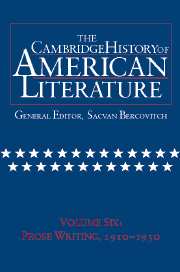Book contents
- Frontmatter
- Introduction
- A Cultural History of the Modern American Novel: Introduction
- 1 A Dream City, Lyric Years, and a Great War
- 2 Fiction in a Tme of Plenty
- 3 The Fate of Writing During the Great Depression
- Fictions of the Harlem Renaissance
- 1 A New Negro?
- 2 Black Manhattan
- 3 Avatars and Manifestos
- 4 Harlem as A State of Mind: Hughes, McKay, Toomer
- 5 A New Negro, A New Woman: Larsen, Fauset, Bonner
- 6 “Dark - Skinned Selves Without Fear or Shame”: Thurman and Nugent
- 7 Genre in The Renaissance: Fisher, Schuyler, Cullen, White, Bontemps
- 8 Southern Daughter, Native Son: Hurston and Wright
- 9 Black Modernism
- Ethnic Modernism
- Chronology
- Bibliography
- Index
2 - Black Manhattan
from Fictions of the Harlem Renaissance
Published online by Cambridge University Press: 28 March 2008
- Frontmatter
- Introduction
- A Cultural History of the Modern American Novel: Introduction
- 1 A Dream City, Lyric Years, and a Great War
- 2 Fiction in a Tme of Plenty
- 3 The Fate of Writing During the Great Depression
- Fictions of the Harlem Renaissance
- 1 A New Negro?
- 2 Black Manhattan
- 3 Avatars and Manifestos
- 4 Harlem as A State of Mind: Hughes, McKay, Toomer
- 5 A New Negro, A New Woman: Larsen, Fauset, Bonner
- 6 “Dark - Skinned Selves Without Fear or Shame”: Thurman and Nugent
- 7 Genre in The Renaissance: Fisher, Schuyler, Cullen, White, Bontemps
- 8 Southern Daughter, Native Son: Hurston and Wright
- 9 Black Modernism
- Ethnic Modernism
- Chronology
- Bibliography
- Index
Summary
Harlem and the Renaissance exist as twin lieux de mémoire, places where individual and collective memories transform actual places and events into metahistorical, communal symbols. 1920s Harlem, held to be synonymous with the “New Negro” movement, figures as one such place. Black Harlem, with its shifts in social alignment, its geographic and transatlantic movements, its breaking-down and interrogation of boundaries between peoples and art forms, deserves pride of place for its imagined-yet-actual home for African Americans. If modernism denotes the yoking together of disparate forms and themes, and the creative efforts of those convinced that the world was not to return to its prewar “innocence,” then the authors of the Renaissance represent an integral part of that international movement. And if alienation – from one’s land, from one’s nation, from one’s place in the world – has been called a salient characteristic of the modernist frame of mind, who better could represent that anomic status than Americans of African descent? They too well personified the citizen without rights, the wanderer in new and strange lands.
For black American intellectuals then and now, the Harlem Renaissance contains symbolic cruxes. The New Negro movement demanded an end to the “subservient” Negro, and the beginning of the dismantling of repression. The Renaissance spoke to the inner self and longings of black Americans in a way that white mainstream writers could not and would not. When in “The Negro Speaks of Rivers” (1922) Langston Hughes wrote “I have known rivers” in both the Congo and the Americas, he spoke to the idea of the African diaspora, long before the concept became a familiar term in the academy.
- Type
- Chapter
- Information
- The Cambridge History of American Literature , pp. 289 - 294Publisher: Cambridge University PressPrint publication year: 2002



